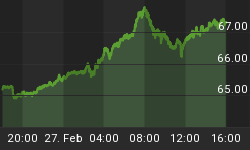Some of the words that are commonly used by economists and financial journalists create an inaccurate picture of what's really happening in the world. The words "inflation" and "deflation", for instance, are routinely used to describe changes in prices, but using the words in this way will tend to mislead. This is because prices change for many different reasons and most of these reasons have nothing to do with inflation or deflation. For example, when Walmart reduces its costs and selling prices by arranging for its products to be manufactured in China the resultant fall in prices has nothing to do with deflation.
Inflation and deflation weren't at the front of the pack in the "Financial World's Most Misleading Words" contest, however, because the words themselves aren't misleading; the problem revolves around the fact that most people don't know what these words really mean. On the other hand, the two words discussed below -- the joint winners of the aforementioned contest -- create false impressions even when they are defined correctly.
Without further ado, we are pleased to announce that the first co-winner of our misleading words contest is...stagflation.
Stagflation is a word that was coined by economists during the 1970s to describe what was previously thought to be an impossible, or at least highly improbable, situation. Prior to the 1970s the average economist had come to believe that there was a trade-off between economic growth and inflationary effects; specifically, that in order to get higher growth you had to tolerate greater increases in prices and that if you wanted to reduce the rate at which prices were increasing you had to put up with slower economic growth. So when they looked around and observed the combination of rapidly rising prices and slow growth they felt the need to invent a new word to describe the situation.
Stagflation, however, is not just an unnecessary word; it's a misleading one. It's unnecessary because after the final official link between national currencies and gold was eliminated in 1971 it became a virtual certainty that long periods of slow growth would be accompanied by more rapid increases in prices. This is because there were no longer any limitations on the extent to which counter-cyclical monetary and fiscal policies could be conducted (the requirement to maintain a fixed exchange rate between gold and the US$ no longer limited the amount of new currency that central banks and governments could create in response to a slowing economy). That is, the word does not describe something unusual in a world where governments and central banks fight every economic downturn by printing money or borrowing money into existence; instead, it describes what will normally happen whenever the economic growth rate tanks.
But if stagflation were simply an unnecessary or redundant word it wouldn't have done so well in the "Financial World's Most Misleading Words" contest. Its good showing in this contest is because its continuing use perpetuates the myth that there's a positive correlation between economic growth and rising prices, that is, the myth that strong growth causes prices to rise. The reality is the opposite: the rate of increase in the general price level and the rate of real economic growth are INVERSELY correlated (the more 'stuff' that is produced the lower the general price level will tend to be). This has always been the case, but it probably took the unrestrained inflation of the 1970s to bring the point home.
The other co-winner of our misleading words contest is...reflation.
In order for something to be reflated it must first be deflated, but over the past 50 years we have not seen anything remotely resembling genuine deflation. On the contrary, what we've seen are varying rates of inflation. This means that every time the word 'reflation' has been used to describe what's been happening in the economy it has helped paint a misleading picture.
The word 'reflation' became especially popular during the final quarter of 2002 and throughout 2003 when the rallies in stock and commodity prices came to be termed "the reflation trade". But as we noted at the time, the fact that the inflation rate (the money supply growth rate) had reached a multi-decade high during the second half of 2001 meant that what we were actually seeing was an inflation trade (the natural and inevitable effects of the preceding massive inflation coming to the fore), not a reflation trade.
Central banks -- the engines of inflation -- never have to reflate because they never permit deflation to occur. To maintain the inflation is, in fact, the reason for the existence of central banking, meaning that if it ever became impossible for a central bank to maintain the inflation there would be no reason for that bank's continued existence. Fortunately for the central bankers of the world, the current monetary system provides them with unlimited scope to create money from nothing. This means they will continue to have jobs as long as the current monetary system remains in place.















